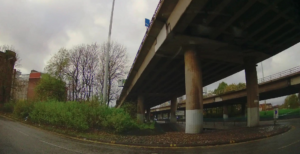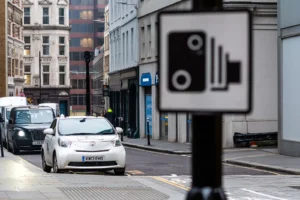Smart city mobility solutions company Q-Free has announced a four-year agreement with the City of Glasgow to supply and install cycle detection equipment and associated services.
The agreement includes interactive and customised flashing electronic bicycle-activated warning signs which warn drivers that cyclists are approaching a junction or travelling in the cycleway ahead where visibility of the cyclists may be compromised due to street furniture or building lines.
Q-Free says its HI-TRAC® CMU bicycle and pedestrian monitoring system also aligns with the company’s commitment to protecting the environment, featuring unobtrusive controller boxes that can be powered by a single solar panel.
“A key aim for Glasgow City Council’s strategic cycling plan is to create a vibrant city where cycling is accessible, safe and attractive to all,” said Christine Francis, Glasgow City Council’s Head of Technical Services. “Safety is seen as the main barrier to people cycling more frequently, so improving cyclist safety is a cornerstone of our efforts to promote a shift to more sustainable forms of transportation.”
According to Ms. Francis, it was in support of this strategy and their search for innovative solutions to common design issues, that Glasgow City Council began working with Q-Free in 2016. “We worked closely with the Scottish team at Q-Free on an integrated system that gives priority to cyclists at signalised crossings,” she said. “The success of this solution led to further partnership working and idea sharing.
“Glasgow City Council was the first local authority in the UK to install cycle activated electronic signage on the road network. We have since installed these at further 16 locations around the city to help improve safety for cyclists.
Q-Free says the resulting innovative lighted warning system improves cycle and pedestrian safety and helps address Glasgow’s dynamic mobility requirements. Using the HI-TRAC CMU bicycle detection solution as the starting point, the system uses in-road piezo-electric sensors 75 ft in both directions from a junction. When the sensors detect a cyclist, they immediately trigger flashing lights on triangular warning signs alerting drivers in all directions to their approach.
The accuracy of cycle detection of the Q-Free equipment was recognised by Glasgow City Council and led to the replacement of Glasgow’s suite of induction loops style cycle counters with Q-Free technology.
The company explains that initial findings from an early installation at a junction with known issues of vehicle/cycle conflicts “showed promise”. Incidences of vehicle/cycle conflict reduced from 17% to 8% while the number of vehicles failing to yield to oncoming cyclists reduced from 35% to 22%.
Initially, 16 systems which could feature as many as three signs and accompanying sensors, are being strategically deployed at different sites throughout the city. The sites were selected based on historical data and the potential to prevent incursions between bikes and other vehicles. As a sign of the solution’s adaptability, systems have even deployed at pedestrian underpasses to warn cyclists to slow down and be cautious of people on foot. The new systems are considerably more driver and traffic engineer friendly as the controller boxes feature low-voltage technology and are fitted to drop down poles for easy maintenance access.
Q-Free adds that the installation “could not be timelier, or more urgent”. A report by the Glasgow Indicators Project, a collaboration between local partners including Glasgow’s City Council, indicates a 111% increase in bicycle trips into and out of the city between 2009 and 2018 representing an average increase of 12% per year.
Colin Reekie, Q-Free UK’s Head of Business Development who is based in Scotland is thrilled to be working with such a progressive community. “Glasgow has truly embraced alternative mobility,” he said. “Bicycling has become such a part of the community as the city center becomes an increasingly attractive place to live, work, and play, and we couldn’t be more excited to help the region protect their most vulnerable road users.”
Q-Free’s Senior Executive Vice President of Traffic Management Morten Andersson added, “We know many communities are risk averse, and in many ways, Glasgow has taken the risk out of the equation. We’re confident this solution will make a difference in the lives of Glaswegians and protect cyclists in countless other communities around the globe.”
Andersson concluded that the solution also aligns with the company’s overarching commitment to ESG and Sustainable Development Goals. “We go to work every day hoping to do two things: improve mobility and make the world a little better. We do this through sustainable solutions that promote sustainable means of transportation and help keep all road users safe. The HI-TRAC product suite helps transportation ministries track, plan, and protect their most vulnerable users and grade progress towards their larger emission-reducing goals.”
(Picture – Q-Free)
























